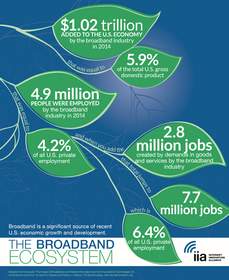WASHINGTON, DC--(Marketwired - May 5, 2016) - For the past decade, the broadband and information and communications technologies (ICT) sector has fueled enormous growth and development in the American economy, according to a new 20-page report from the Internet Innovation Alliance (IIA) that analyzes broad trends in the economic value, output, and employment in this key sector. The study concludes that the Federal Communications Commission's (FCC) effort to impose Title II regulation on broadband providers could "adversely affect broadband/ICT sector investment, with potentially significant secondary costs for the other industries that depend on it and the overall American economy," the study states.
Authored by Kevin A. Hassett and Robert J. Shapiro, "The Impact of Broadband and Related Information and Communications Technologies on the American Economy" highlights how steady demand for the broadband/ICT sector's goods and services has helped spur U.S. employment and GDP growth over the past decade. Principal findings of the research include:
- In 2014, the U.S. broadband/ICT sector produced $1,019.2 billion in value added for the American economy, equal to 5.9 percent of U.S. GDP of $17,420.7 billion in 2014. "This substantial share of all U.S. economic value added has been roughly stable for the past decade and likely understates the sector's full contribution by undervaluing technological improvements," the paper explains.
- The use of U.S. broadband/ICT goods and services by U.S. private industries, and the information sector (and government), contributed an additional $692.0 billion in output in 2014, equal to 2.7 percent of their combined output and 4.0 percent of GDP. Including the government sector, the use of U.S. broadband/ICT goods and services by other industries and sectors contributed $843.3 billion in output in 2014, equal to 2.9 percent of their combined output and 4.8 percent of GDP.
- The companies that comprise the broadband/ICT sector employed 4,933,000 workers (full-time equivalents or FTE) in 2014, or 4.2 percent of all U.S. private employment and 3.5 percent of all non-farm employment. Demand by the broadband/ICT sector for goods and services produced by other industries was responsible for an additional 2,784,683 jobs (FTE) in 2014. All told, the broadband/ICT sector was responsible for 7,717,683 jobs (FTE) in 2014, or 6.4 percent of all U.S. private employment and 5.5 percent of all non-farm employment.
- The average compensation of broadband/ICT sector workers in 2014 was $104,390, 59.3 percent greater than the average compensation earned by other U.S. workers ($65,517).
"The large economic gains associated with the broadband and ICT sector have flourished in an environment of light federal regulation," commented Hassett and Shapiro. "The FCC's proposed regulation of broadband Internet Service Providers (ISPs) and their service offerings would stifle broadband/ICT sector investment, growth and employment, negatively impacting the American economy."
"Today, high-speed Internet is the backbone for 21st century economic growth in the digital economy," said Rick Boucher, a former Democratic congressman who chaired the Energy and Commerce Subcommittee on Communications and the Internet and now serves as honorary chairman of the IIA. "Unnecessary price regulation in competitive broadband markets will have far-reaching negative impacts on U.S. economic growth and development. Without ample investment in modern networks, consumers and the entire broadband ecosystem -- from ISPs to edge providers -- will suffer from reduced innovation and fewer cutting edge broadband services, as well as reduced jobs and economic growth in the nation's Internet economy."
To read IIA's study in its entirety and download an infographic that highlights Hassett and Shapiro's findings, go to www.internetinnovation.org/library/special-reports/u.s.-broadband-the-u.s.-economy/.
About The Internet Innovation Alliance
The Internet Innovation Alliance was founded in 2004 and is a broad-based coalition supporting broadband availability and access for all Americans, including underserved and rural communities. It aims to ensure every American, regardless of race, income or geography, has access to this critical tool. The IIA seeks to promote public policies that leverage the power of entrepreneurs and the market to achieve universal broadband availability and adoption.
Contact Information:
For more information contact:
Lauren DuBois
(917) 573-2485
lauren@internetinnovation.org
